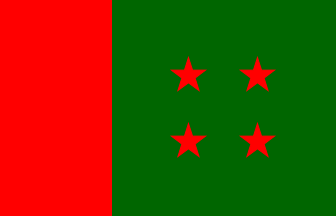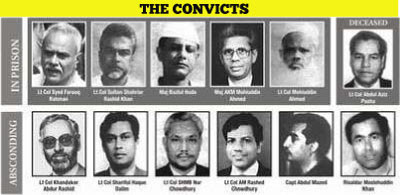WE WANT JUCTICE FOR WAR CRIMES 1971,HOLLAND AWAMI LEAGUE

War crimes to be tried under Int'l Crimes Act 1973
The government decided to try the war criminals under the International Crimes (Tribunal) Act of 1973, signalling a significant development in the country’s political arena 38 years after the Independence.
Law Minister Shafique Ahmed disclosed this today (Wednesday) while talking to reporters after an inter-ministerial meeting on the trial of war criminals.
The investigation process for holding the trial “has already started,” he said.
Those who were involved in killing, loot, arson, rape, detention or forcing people into leaving the country during the Liberation War will be brought under this act.
Those who were members of different collaborating forces would also be brought to book under this law, he added.
Elaborating on the concrete plan of trial already drawn up, he said one or more tribunals would be set up for the war-crime trial.
The tribunal will be constituted with a chairman and two to four members.
The law minister said the accused will get the chance of self-defence and appointing lawyer and will also be able to appeal against the verdict of the tribunal in the Appellate Division of the Supreme Court.
Prosecutors and investigation agencies will be appointed.
In reply to a question, Shafique said the law ministry has got no list of the war criminals. The list is with the government and the home ministry.
Asked if the trial could create political unrest, he said the matter is looked by the policymakers and subject to decision of the cabinet.
To another question, he said if investigation could not prove one guilty, the case against him would be dismissed and a second case for the same offence could not be filed.
Earlier, an inter-ministerial meeting on the war-crime trial for the first time today reviewed provisions of the International Crimes (Tribunal) Act 1973 to see if the 1971 war criminals of Bangladesh could be tried under this law.
After the meeting, state minister for home affairs Sohel Taj told reporters that they also discussed the formation of tribunal, appointment of prosecutors and investigation agencies.
“We want to hold trial of the war criminals according to our election commitment and the present session of parliament passed a resolution for quick trial of the war criminals,” Taj said, as the government move gathered pace on the eve of the country’s Independence Day.
Law Minister Shafique Ahmed disclosed this today (Wednesday) while talking to reporters after an inter-ministerial meeting on the trial of war criminals.
The investigation process for holding the trial “has already started,” he said.
Those who were involved in killing, loot, arson, rape, detention or forcing people into leaving the country during the Liberation War will be brought under this act.
Those who were members of different collaborating forces would also be brought to book under this law, he added.
Elaborating on the concrete plan of trial already drawn up, he said one or more tribunals would be set up for the war-crime trial.
The tribunal will be constituted with a chairman and two to four members.
The law minister said the accused will get the chance of self-defence and appointing lawyer and will also be able to appeal against the verdict of the tribunal in the Appellate Division of the Supreme Court.
Prosecutors and investigation agencies will be appointed.
In reply to a question, Shafique said the law ministry has got no list of the war criminals. The list is with the government and the home ministry.
Asked if the trial could create political unrest, he said the matter is looked by the policymakers and subject to decision of the cabinet.
To another question, he said if investigation could not prove one guilty, the case against him would be dismissed and a second case for the same offence could not be filed.
Earlier, an inter-ministerial meeting on the war-crime trial for the first time today reviewed provisions of the International Crimes (Tribunal) Act 1973 to see if the 1971 war criminals of Bangladesh could be tried under this law.
After the meeting, state minister for home affairs Sohel Taj told reporters that they also discussed the formation of tribunal, appointment of prosecutors and investigation agencies.
“We want to hold trial of the war criminals according to our election commitment and the present session of parliament passed a resolution for quick trial of the war criminals,” Taj said, as the government move gathered pace on the eve of the country’s Independence Day.
“The trial will begin soon,” said the minister.
Wednesday, March 25, 2009


